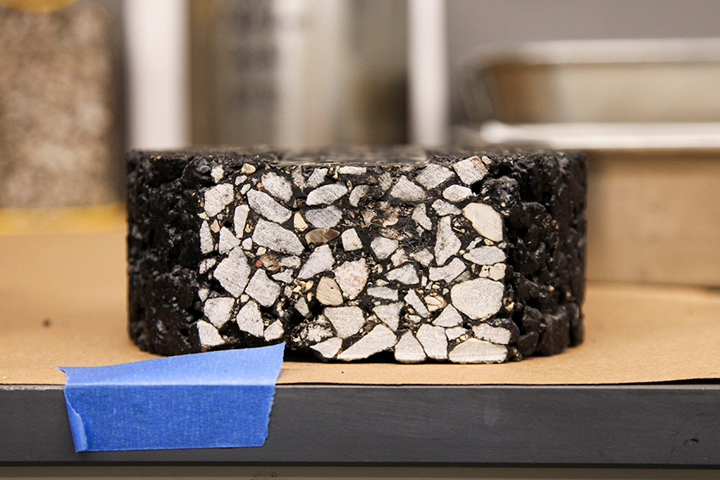Applied Testing of Recycled Plastic in Road Pavement Materials
A section of I-155 in Missouri is the latest real world test of roads paved in recycled materials.
Researchers at the University of Missouri are using recycled materials including plastic waste in experimental replacements for traditional asphalt pavement. In partnership with the Missouri Department of Transportation, the research team has recently created a real-world test road along a portion of Interstate 155 in Southeastern Missouri.

A sample of asphalt material ready for testing at the University of Missouri lab.
Photo Credit: University of Missouri
The test road will be used to compare the effectiveness of nine different types of recycled materials in the creation of asphalt pavement. These include three different types of polyethylene (PE) and ground tire rubber.
According to Bill Buttlar, director at the Mizzou Asphalt Pavement and Innovation Lab, building at full scale will help researchers determine if the rock, asphalt, and plastic and rubber additives successfully bond to create a road that can stand up to weather conditions and heavy traffic.
Previously, the group had installed a test road along Stadium Boulevard in Columbia, MO, to evaluate four types of recycled materials. The group specializes in a dry process that enables the addition of recycled materials directly into the mixture before its application to the road surface.

An asphalt roller compacts plastic waste pavement mixture along Stadium Blvd. in Columbia.
Photo Credit: University of Missouri
Related Content
-
At NPE2024, Follow These Megatrends in Materials and Additives
Offerings range from recycled, biobased, biodegradable and monomaterial structures that enhance recyclability to additives that are more efficient, sustainable and safer to use.
-
The Recycling Collaboration That Is Making Circular Film a Reality
Nova Chemicals and Novolex are commissioning a large mechanical recycling facility for film to film.
-
Looking to Run More Regrind? PTXPO Workshop Tackles How
When it comes to making injection molding operations more sustainable, the lowest hanging fruit is the use of regrind, but that doesn’t mean it’s not without challenges.


